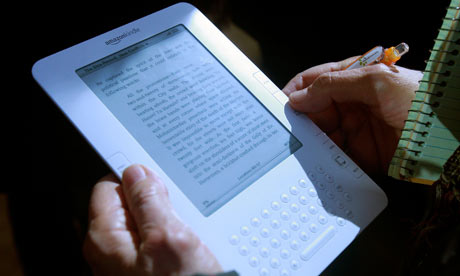
If you commute or travel by tube, you could soon start to see lots more people reading books, magazines and even newspapers on "electronic paper" now that Amazon has started shipping its Kindle ebook reader internationally. The black-and-white six-inch LCD screen isn't as good as paper, but it's perfectly readable in most lighting conditions, and button-presses take you quickly from page to page.
This is not to damn with faint praise, because the Kindle does have advantages over its paper parents. You can, for example, buy a new book in mid-journey, if you get bored with the one you were reading. Amazon's one-click ordering system makes this scarily easy. You don't even have to log in.
A new novel downloads silently and automatically over the Kindle's mobile phone connection – Amazon's Whispernet – in a minute or less. You can also look up words in the Kindle's built-in (American) dictionary, or use its web browser to consult Wikipedia.
And while Kindle is a bit smaller than a book, its 1.4GB of free memory can hold a lot more words. If you want to carry the whole Harry Potter series at all times, along with everything by JRR Tolkien, you can. No matter how much you stuff into it, the Kindle never gets any bigger.
You can even have the Kindle read books to you in a male or female voice, using text-to-speech software, or have it play music in the background: there are tiny stereo speakers on the back of the machine, or you can use headphones. However, you can't even get a list of songs: they just play in the order you loaded them. Also, in the UK, web access is limited to Wikipedia: no Guardian, no BBC etc.
Amazon points out that the web browser and audio capabilities are currently free, experimental features, and are still under development. But the result is that the Kindle is far from offering a challenge to an MP3 player or mobile phone for anything except consuming books.
Indeed, the Kindle's UK availability doesn't even represent a concerted attack on the ebook market, where Sony's Reader series is fairly well established. "Internationally available" means that if you buy a Kindle for $259, Amazon will ship it to the UK. The change isn't in the device, which still comes with a US plug (though you can charge it via a USB cable): the change is that your Kindle will automatically work with a local Whispernet (3G or GPRS) mobile phone service.
My Kindle arrived as a review sample, but a real buyer told me his final bill included $20.98 for Shipping & Handling and an Import Fees Deposit of $45. To that, I'd want to add $29.99 for the smart black leather case, which makes it much more comfortable to carry a Kindle: it's sturdy but will benefit from protection. This takes the ball-park price for playing up to about $350 (£214).
An ebook reader could, of course, pay for itself in a year or two if users could save money on books. After all, it's much quicker, cheaper and more carbon-efficient to deliver a computer file by phone than put a book in the post. But it's hard to see any savings.
Having just unpacked my loaner, I bought a book: Neal Stephenson's Quicksilver, the first volume in The Baroque Cycle. The price from Amazon.com was $9.65 (£5.90), confirmed by email. But truth to tell, I'd rather have bought the massive 926-page paperback from Amazon.co.uk for £6.99, or a second-hand copy at prices as low as £1.47 (plus postage). There are no second-hand ebooks floating around….
If I'd been buying in the US, then I would have got my book for less. Amazon is not keen to discuss pricing differentials, but says its $9.99 best-sellers convert to $11.99 or $13.99 in Europe. That covers the "extra operational costs" plus VAT, says a spokesman. Crazy as it sounds, VAT is payable on ebooks, but not physical books.
Much as I like the idea of ebooks, I don't expect the Kindle to make much impact on global paper consumption, unless there are some fundamental changes. I'd want to pay less for an ebook, for starters, and I'd also want the right to give it away or sell it on if I no longer want it. This isn't allowed.
There's a great case for having heavyweight textbooks, legal tomes, field-service manuals and even tourist guides in a searchable electronic format like Amazon's. But for novels and books that need colour, the drawbacks may be too big for most people.

